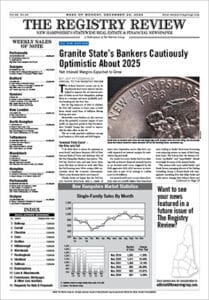
High home prices and interest rates mean the demographics of the Granite State’s traditional types of home buyers have changed significantly. iStock illustration
Record-high home prices and low inventories of homes for sale are changing the demographic make-up of those buying single-family houses and condominiums today in New Hampshire.
According to real estate industry experts surveyed by The Registry Review, homebuyers still fall into one of four main categories in the Granite State: first-time buyers, move-up buyers, downsizing buyers and vacation or seasonal-retirement buyers.
But there’s a shift underway over who is making up the bigger share of home purchases in the state – and there are even demographic shifts underway within individual categories of homebuyers.
Among first-time homebuyers, for instance, a more affluent class of young households, with incomes of $250,000 and up, is increasingly outbidding their less-affluent peers for available properties across the state, according to one industry source.
Meanwhile, so-called “move-up” buyers – usually young couples with children seeking to sell their smaller starter homes for larger residences – are less likely to step up these days, due largely to higher interest rates they’ll have to pay in order to trade up.
Other factors are also changing traditional market dynamics, from the rise of remote working to younger buyers increasingly turning to their parents for financial assistance.
First-Time Buyers Earn More
There are no official statistics on the typical first-time homebuyer in New Hampshire, but most say it’s a given they’re younger – and they’re struggling to buy at a time of record high prices and low inventory of homes for sale.
“First-time buyers are regularly losing out to other buyers,” said Joanie McIntire, associate broker at Coldwell Banker J. Hampe Assoc. in Concord.
They currently make up about one-third of her firm’s buyers, said McIntire, the incoming president of the New Hampshire Association of Realtors.
A.J. Lane, a loan officer at CMG Home Loans in Portsmouth, agreed that first-time buyers in general aren’t landing deals as often as they did in years past, when home prices were lower and the numbers of units for sale were higher.
“There’s definitely more swings and misses these days,” Land said of first-timers losing out in bidding wars.
But first-time buyers still make up about 35 to 40 percent of his loan business, though the demographic characteristics of first-timers has recently changed, Lane said.
In the past, first-time homebuyers tended to have household incomes in the range of $65,000 to $120,000. Today, Lane said he’s seeing more affluent first-time homebuyers, with household incomes of $250,000 to $300,000.
Among the reasons for the shift: the rise of remote working is attracting more affluent first-time homebuyers from other states.
Parent Help More Necessary
As for less affluent first-time homebuyers, real-estate experts say they’re relying more on parents for financial assistance, particularly when it comes to raising funds for down payments.
Indeed, Redfin recently reported that 38 percent of recent homebuyers under the age of 30 nationwide have used either a cash gift from a family member or an inheritance in order to afford their down payment, based on a recent survey of homebuyers.
“They are hurting,” said Lane of non-wealthy first-time buyers. “They’re working hard to make it work. Some are making it happen. But it’s not easy.”
Besides relying on parents for financial help, many first-timers are turning to various government and nonprofit organizations for assistance.
Heather McCann, a senior director at the New Hampshire Housing Finance Authority, said her agency is seeing an increase in people seeking assistance via its various loan programs.
The median household income of those seeking assistance is $81,700, just below the statewide median of $83,449, with the average family size of 2.25, she said.
When they can, most NH Housing borrowers are purchasing smaller single-family homes and condos in Manchester, Concord and farther north – with fewer purchases in the more expensive southern portions of New Hampshire, she said.
The average purchase price for NH Housing participants: $276,700.
Move-Up Buyers Down
Move-up buyers are still around – and they’re snapping up larger and more expensive homes when they set their mind (and money) to their home-buying mission.
Real estate agents in classic bedroom communities say move-up buyers still constitute the largest segment of their home-purchase business.
McIntire said she’s seeing more move-up buyers getting loans via local financial institutions and via recast loans.
But CMG’s Lane said he’s seeing fewer move-up buyers than in the past. The reason: most of them have historically low mortgage rates on their starter homes, which were purchased before last year’s rise in rates.
“They’re almost held captive by the older rates,” he said. “The step-up people are largely staying put. Interest rates are higher. Prices are higher. And there’s less inventory.”
Downsizers Staying Put, Too
This is another category of buyers who are often staying put: downsizers, or elder “empty nesters” who would like to sell their larger homes, but can’t or won’t due to today’s record-high home prices and low inventory in New Hampshire.
But when they do make the move to smaller abodes, it’s often to townhouses or condos in Manchester, Portsmouth and other towns and cities with walkable downtowns with plenty of amenities, industry experts say.
Oftentimes, those downsized townhouses and condos actually cost more than the old homes they sold, but more affluent empty nesters can finance the moves via a combination of cash and small loans.
Empty-nester buyers also constitute a large segment of the all-cash purchases now increasingly seen across New Hampshire and the nation, market-watchers say.
Retirees, Vacationers Dominate Some Areas
Adam Dow, owner of the Dow Group at Keller Williams, said “class A” buyers have dominated his firm’s mountain, lakes and coastal markets for about three years now – and they often pay in cash.
They include retired people buying vacation homes as well as affluent out-of-staters buying get-away abodes in more desirable places.
Those buying second vacation homes constitute about 40 percent of his overall business, Dow said.
Not surprisingly, only 10 percent of Dow’s business in the mountain, lakes and coastal markets is via first-time homebuyers.
“It’s just too expensive for them,” said Dow. “The first-time demand is high, but not the sales.”
Some real-estate agents say out-of-state buyers of homes in New Hampshire has ebbed from its peak during the COVID-19 pandemic
But Bill Weidacher, a partner at Fine Homes Group in Bedford and past president of the New Hampshire Association of Realtors, said “high-end out-of-staters” still account for about 35 percent of his business.
“There’s still a fair amount of people who want to live in New Hampshire,” he said.
Meanwhile, first-time buyers are “really feeling the crunch,” accounting for 25 to 30 percent of his sales, down from 30 percent to 40 percent before the pandemic, Weidacher said.
“There are still first-time buyers out there, but it’s tough for them,” he said.

